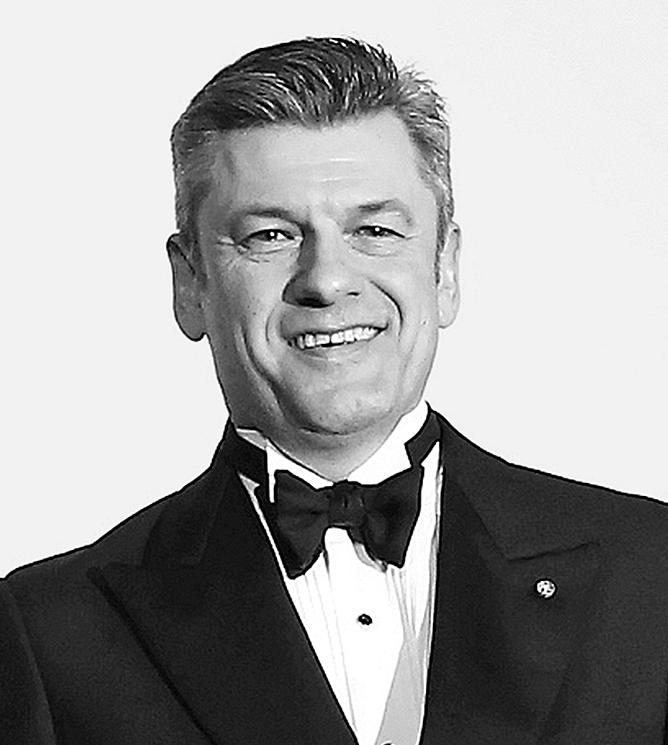




Introduction . . . . . . . . . . . . . . . . . . . . . . . . . . . . . . . . . . . . . . . . . . . . . . . . . . . . . . . . . . . . . . . . . . . . . . . . . . . . . . . . . 4
Tracking the Ebb and Flow of FDI into Hungary . . . . . . . . . . . . . . . . . . . . . . . . . . . . . . . . . . . . . . . . . . . . . . . . . . . . 5
Bilfinger Tebodin Consultancy Offers Smart and Sustainable Solutions 6
VALUE-ADDED ECONOMY 8
On the Path to a Knowledge-intensive Economy With the Help of FDI . . . . . . . . . . . . . . . . . . . . . . . . . . . . . . . . . 10
Flexible Office Solutions: Key to Retaining Tenants . . . . . . . . . . . . . . . . . . . . . . . . . . . . . . . . . . . . . . . . . . . . . . . . 16
FDI OVERVIEW . . . . . . . . . . . . . . . . . . . . . . . . . . . . . . . . . . . . . . . . . . . . . . . . . . . . . . . . . . . . . . . . . . . . . . . . . . . . . 18
EV Battery Investments Lift Hungary’s FDI Market in 2022 20
A Commitment to the Future, to Sustainability and to Tenants 26
ESTATE INVESTMENT 28
Investment-grade Real Estate Product Available in Hungary . . . . . . . . . . . . . . . . . . . . . . . . . . . . . . . . . . . . . . . . 30
Stop Press: Codic Hungary Sells Green Court Office for EUR 77 mln . . . . . . . . . . . . . . . . . . . . . . . . . . . . . . . . . . 36
FDI CASE STUDIES . . . . . . . . . . . . . . . . . . . . . . . . . . . . . . . . . . . . . . . . . . . . . . . . . . . . . . . . . . . . . . . . . . . . . . . . . 38 BMW iFactory to get Battery Plant as Investment Doubles 40 Korean Battery Supplier Establishes 1st European Footprint in Hungary 42
Wherever you choose to invest your money, these are times that, at least on the surface, appear to be as full of challenges as opportunities. Hungary is no different in that regard. High inflation, slowing growth, and the energy crisis need to be weighed and factored into the risk and reward equation, and none are country-specific.
Energy supply and security are more of a direct concern for Hungary than many other European nations. It is easy to dismiss Hungarian opposition to oil and gas embargoes as just the latest example of the government’s apparent glee in playing up to its selfappointed role, along with Poland, as lead members of the EU awkward squad, now the United Kingdom has picked up its ball and gone to play on its own outside the club of 27. But that is to ignore Hungary’s near utter dependency on Russian oil and gas imports. Budapest backing Russian fossil fuel embargos would be akin to turkeys or geese voting for Christmas.
A more legitimate line of attack might be to wonder why Hungary did not do more to diversify its energy supply earlier, and that is undoubtedly a criticism the United States, in particular,
has made time and again. It is no secret that Viktor Orbán’s government and the administration of U.S. President Joe Biden are far from natural bedfellows. But even the Donald Trump-appointed former U.S. Ambassador David B. Cornstein, who regarded the Hungarian Prime Minister as a friend, expressed exasperation when asked about this in an exclusive interview we made with him in 2019. He also pointed out that, while Hungary has done a lot to develop two-way interconnectors with its neighbors, that diversifies routes but not supply since the ultimate gas source is still primarily Russian. In February 2022, Minister of Foreign Affairs and Trade Péter Szijjártó said that the Hungarian government is negotiating to purchase natural gas from Azerbaijan from the end of 2023 to be shipped through southern Europe. “When looked at from a technical rather than from a political or ideological angle, it will become obvious that the only realistic source from which to diversify Europe’s gas supplies is Azerbaijan’s gas fields,” the minister said at the time.
In fairness to the Hungarian government, they would – and do –point out that the two most obvious non-Russian sources, Azerbaijan aside, are LNG shipments and the Neptune oil field off the Romanian coast. In both cases, developing the infrastructure for them is largely down to other nations, especially in the case of the Black Sea reserves. It should also be pointed out that while Hungary tops the table, it is not alone in its Russia reliance: In descending order, Latvia, Finland, Estonia, the Czech Republic, Slovenia, Slovakia, and Bulgaria are all extremely dependent, according to 2021 data from EU statistical body Eurostat. Many, like Hungary, are landlocked and, therefore, can only access oil and gas through pipelines, aside from relatively
small natural reserves below ground. Although less drastically affected, Austria and Germany also made the top 10; however, the latter has the benefit of a coastline and has been working hard to find alternative sources, most recently LNG from Qatar.
What is certain is that, despite these concerns, plenty of investors are willing to place their money in the Hungarian market, surely an indication that they feel the underlying fundamentals remain sound. Thirdquarter figures were published just as we were approaching our print deadline and showed the volume of investments had increased by 7.7% in Q3 2022, compared to the same period of 2021, significantly exceeding market expectations. It grew by 1.9% compared to the previous quarter, according to the latest data released by the Central Statistical Office.
As we explore inside this publication, it is not a massive surprise that the investment volume in the manufacturing industry has increased, as investments related to battery production and the automotive sector have ruled the domestic market this year. Approximately 60% of the HUF 4.9 trillion total working capital investment announced was made up of a single HUF 2.9 tln (EUR 7.3 billion) project from CATL related to the battery market. That greenfield investment is not in Budapest, but Hungary’s second city, Debrecen. Increasingly, investors are finding their way into the further reaches of the country and, indeed, are being encouraged to do so by government incentives.
Whether you are considering an investment in Budapest or beyond, we hope you find this publication informative and useful.
Robin Marshall Editor-in-chief Budapest Business Journal
As a law firm that has positioned itself to advise foreign investors concerning their activities in Hungary, we at Lakatos Köves & Partners are sensitive to the ebb and flow of sentiment towards investing in the country and also see, through the work that lands on our desks, what is actually happening that requires legal input.
Politically, Hungary may be more isolated than it has ever been in recent years, both because of its long-running disputes with its neighbors and fellow EU members and, most recently, because of its approach to the war in Ukraine. We have heard of Western European, U.S. and Japanese investors expressing concern about Hungary’s position regarding Ukraine, civil organizations, the LGBTQ-plus community, etc., and thus reluctant to make investments here.
Decisions on significant investments are taken with a long-term view. It often surprises people that Hungary ranks 17 in the Statista “globalization index,” down a few positions from 10 years ago but still only behind the Czech Republic among its regional peers. The investments today build on that existing track record, whether directly (i.e., in the expansion of a current investment) or indirectly, following the well-worn path trod by earlier investors.
Against that background, we see various areas of growth and opportunity and a number of significant risks.
The biggest story in Hungary for several years has been the automotive industry, which has a history going back decades and is now a significant component of the economy. That story continues with major investments in state-of-the-art factories and R&D facilities and, in particular, battery and automated driving technology. The Hungarian government’s “Opening to the East” policy is reflected in the high levels of Korean, Chinese and Japanese investments.
Important for the automotive and other sectors is the current rethinking of supply chains and the tendency of Asian manufacturers to establish
RICHARD LOCK Founding Partner Lakatos, Köves & Partners
plants in Europe to be closer to their continental customers. In that context, Hungary is considered well placed geographically; the labor force is relatively well-skilled and lowcost, and, for businesses, the tax regime is considered friendly with a low rate of corporate tax, no withholding tax, and significant tax incentives available for major investments.
Also, labor regulations are relatively employer friendly compared to Western European regimes. For several years, Hungary has been used as a holding company jurisdiction in many financing structures, but that position is threatened by the anticipated termination of the U.S.Hungary double tax treaty at the end of 2023.
The main areas in which we have seen a need for legal advice have included greenfield investments by players in the auto industry supply chain; significant real estate activity related to developments in supply chains (logistics parks etc.); transactions and work deriving from Hungary’s strong position in IT, both in terms of locally developed software startups and, in broad terms, players in the e-commerce scene, and lately, alternative clean energy projects.
Looking forward, Hungary faces the same challenges currently seen in other economies,
some of which could present significant problems. If the decoupling between the United States and China continues, this will present considerable challenges to Hungary, which has cultivated a position as possibly the most welcoming economy in Europe towards Chinese investment.
The heavy dependence upon German investment means that difficulties faced by that traditional economic powerhouse will have a significant impact locally (already visible to us in some restructuring and insolvency work). The Hungarian economy is heavily dependent on EU funding, and it is (at the time of writing) unclear whether disputes between Budapest and Brussels on a range of issues blocking the release of EU funds will be resolved. Regulatory changes that are currently being proposed to address Brussels’ concerns, for example, the establishment of an “Integrity Authority” with the possibility of increased scrutiny of public contracts, could clearly, depending on how they will be implemented, affect the conduct of business.
Aside from the manufacturing activity referred to earlier, much of which is in foreign hands, many other areas of the economy (for example, services, utilities, and banking) are in the hands of local players financed by local banks, with both lenders and borrowers close to the government; the ability of these to weather a significant economic downturn is questionable.
We see a toxic mix of cronyism and corruption reflected in the tendency of prominent private equity players to steer clear of Hungary, put off by these perceived “country risks.” The use to which the FDI screening rules have been put in the last couple of years has done nothing to allay such concerns.

• site selection
• master planning
• feasibility study
• red flag report
• due diligence (technical, environmental)
• carbon footprint analysis
Bilfinger Tebodin offers smart, sustainable and cost-effective energy solutions. Our knowledge and experience make a crucial difference to the competitiveness of our clients in challenging market conditions. Always taking the most practical and economical approach, we excel in energy efficiency and competitive renewables.
To reduce energy needs and greenhouse gas emissions in industrial plants, we offer a range of various technologies, processes and services.
“We are supporting industries in the very first steps of investment, during the decision-making. Whether it is a brand new site or a rejuvenation of existing plants, building from the
• CO 2 master planning
• permitting support (building, environmental)
• energy efficiency study
• life cycle assessments
• bank monitoring, lender’s supervision
The energy and industrial sectors are undergoing fundamental change. New price levels and the rise of renewables force many companies to review their traditional business models and develop new ways to face future challenges. The extensive changes particularly impact the process industry.


When it comes to investing in Hungary, the data of the Hungarian Investment Promotion Agency showcases the growing dominance of Asian investors and demonstrates there is now a more obvious balance between projects implemented in the capital and the countryside. In the future, more deals can be expected that bring high value-added jobs to the country.

The office market is constantly evolving and reacts quickly to changes around the world and in the way we work. As does myhive, the innovative office brand. The key is flexibility, a fundamental pillar of the brand and its latest additional services. This concept includes everything a tenant might need: modern, attractive workspaces of any size, flexible office services, and continuous innovations based on feedback from our tenants.
This year, the complete modernization of myhive Haller Gardens in Budapest was completed under the myhive office brand name. The building was renovated, and new services were introduced for flexible working and
versatile use of the office building’s communal spaces. Recognizing recent trends in the office market, the brand first introduced flexible office products such as myoffice and mycowork at myhive Haller Gardens.

We can now proudly say that they are proving very popular with tenants.
The brand quickly recognized the new trend in the office market and the need for flexibility and was one of the first to respond with fresh myhive office products. One of these, myoffice, is an ideal choice for businesses of any size. The concept offers a ready-equipped office where the space is ready to move in and use. Another option is a more customized office space, which can be individually designed from the color scheme to the furniture and related office services.
The myoffice concept offers a solution that takes the burden completely off the shoulders of potential tenants with fullservice offers from planning to handing



Last year, foreign direct investment inflow into Hungary performed exceptionally well, with the annual investment volume reaching almost EUR 6 billion, and eight new investments exceeded the EUR 100 million limit. That is extraordinary not just nationally but regionally. While the market is facing obvious challenges, the outlook is positive. Two Big Four analysts unpack the industry sentiment for 2022 in Hungary with the Budapest Business Journal.
“Such records have obviously been broken in 2022 due to the EV [electric vehicle] battery industry boom: the new CATL battery factory in Debrecen alone can match the 2021 records with an investment value of EUR 7.3 bln,” Detre Horváth, director of Tax Services at PwC Hungary, tells the BBJ
“The EV battery industry invests a lot, and we expect that other global players will arrive soon; this helps to maintain the huge FDI flow no matter what happens in other sectors of the economy,” he adds.

Zsolt Kocsis, tax partner at EY Hungary, agrees about the state of current FDI market sentiment in this country.
“FDI in Hungary reached record levels in the previous years up until 2022 due to the country’s successful economic
policy as well as its highly effective subsidy policy compared to the surrounding states,” he explains.
“This year’s results are not yet finalized [at the time of writing], and [the Hungarian Investment Promotion
“FDI in Hungary reached record levels in the previous years up until 2022 due to the country’s successful economic policy as well as its highly effective subsidy policy compared to the surrounding states.”EVs and green energy can turbocharge the Hungarian economy Image by Blue Planet Studio / Shutterstock com


Hungary is now seen as having a solid pipeline of asset-grade commercial real estate products to meet investor demand, particularly in the office and industrial sectors, writes the Budapest Business Journal’s real estate editor, Gary J. Morrell.

All the various market sectors have been regarded as attractive investment destinations by investors and analysts, with a significant yield premium on Western Europe and, indeed, on Poland and the Czech Republic, Hungary’s regional peers. That pipeline is important, as the limited availability of suitable investment-grade products continues to be an obstacle to market liquidity.
While international, Central and Eastern European regional players and
Hungarian investors all continue to show an interest in the local markets, the current investor hesitancy reflects the geopolitical uncertainty in the region. In this environment, many vendors and investors are adopting a wait-and-see strategy in anticipation of a more favorable political, economic and financial environment.
The Hungarian investor Adventum’s acquisition of the Tesco portfolio was the largest deal in Hungary
in terms of magnitude in 2022, according to Rita Tuza, head of capital markets at JLL Hungary.
“We rarely see such large ticket deals happen in Hungary and the complexity of the deal (14 multi-tenanted assets at various locations in Hungary and additional Czech properties) makes it even more significant,” she said.
There is currently low liquidity in the retail sector in Hungary due to

As this publication was going to print, news broke that Codic Hungary and Pesti Házak Zrt. had sold the Green Court Office development on Váci út for EUR 77.1 million. The transaction proves that there is investor interest in office developments in the capital, the developer says. The building was acquired by Groupama Gan REIM, representing French real estate investment company SCPI Affinités Pierre.
By BBJ StaffThe Green Court Office complex is on the famous Váci út office corridor in District XIII, prized as a location for modern offices as it has good public transport links and direct access to amenities, and is well integrated into the surrounding community. The two-building complex, which has a total leasable area of 20,181 sqm, penned by the Hungarian firm DPI Design, won the “Office Development of the Year” title at the Portfolio Property Awards 2021 and first prize in the “Mixed Function Building” category at the 24th FIABCI Hungarian Property Development Award Competition in November 2022.
The two office buildings at Green Court Office currently have eight international tenants, including Diageo Group, one of the world’s largest spirits distributors, which moved into its new head office in May 2022. Opened in early 2022, Codic says it developed the project to high ESG standards: It has a Breeam “Excellent”
rating and “BB” energy efficiency certification and is a nearly-zeroenergy building (NZEB).
When Diageo officially presented its new offices in the early summer of 2022, it made much of what it called the notable sustainable features. Due to the rainwater harvesting system at Green Court Offices, 100% of the rain can be re-used, which potentially equates to 30,000 bottles of Johnnie Walker per day, the spirits distributor said. Additionally, selective waste collection is greatly emphasized.
Quality LED lighting design supports the goal of lowering the carbon emission footprint. LEDs have an expected lifespan of 50,000 hours, while a typical incandescent bulb lasts only about 1,000 hours. Builtin UV filters provide protection from infection in air handling units, and the role of the double-skin façade is important for acoustics as well as heating/cooling and energy conservation. In addition, there


BMW’s state-of-the-art factory in Debrecen, the cornerstone of which was laid in the summer of 2022, is to get a battery plant to assemble sixth geneneration high-voltage batteries for the fully electric model generation Neue Klasse models which will be built in Hungary’s second city. The latest news means the total investment at the greenfield site will double from EUR 1 billion to EUR 2 bln.
By BBJ StaffOn top of the additional funding, a further more than 500 new jobs will be created at the so-called iFactory by the end of 2025, the same year that the main factory is due to start auto production.

According to the Hungarian Investment Promotion Agency website, “the strategy of the BMW iFactory in Debrecen (225 km east of Budapest) aims to minimize logistics distances,” leading the company to decide to build the EV battery assembly plant on the 400-hectare site.
“Thanks to the project, the batteries of every new BMW model to be built in Debrecen will be assembled on site,” HIPA added.
The battery assembly plant will cover 140,000 square meters, and it is expected to be up and running by the end of 2025. The next generation batteries can provide 30% longer driving range and 30% faster charging speed.
BMW Group says it pays particular attention to reducing emissions and the amount of resources used during its production processes as much as possible. Thanks to this green commitment, battery cell production-
related emissions can also be cut by 60% compared to the existing fifth generation batteries, by using sustainable energy and recycling some cobalt, lithium and nickel, the automaker claims.
BMW Group is also investing billions to produce battery modules back home in Bavaria. That should hardly be a surprise once you consider that by 2030, every second new BMW worldwide will be electric.
Speaking at the announcement of the battery plant addition, Milan Nedeljković, a member of the company’s management board, said the plant would be “the most advanced in the world,” according to Global Construction Review.
“With our iFactory, we are setting new industry standards for vehicle production. Our investments underline our systematic approach to implementing e-mobility,” he said.
The news of the new investment came just days after the site at Debrecen achieved its latest milestone. On November 24, ForestVill, the general contractor for the project, said the infrastructure
The opening of the first European plant of CK EM Solution in Hungary was celebrated on November 17, 2022. The total investment of EUR 10.42 million is being implemented in two stages, the first of which provides an annual capacity of 1,000 tonnes of heat sink glue used for EV battery production.


